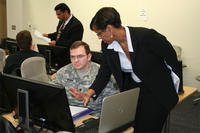Note: The Troops to Teachers program ended on Oct. 1, 2020. This information is for historical purposes only.
FORT MEADE, Md. – About 60 servicemembers preparing to retire or separate from the military got the word loud and clear during a recent Transition Assistance Program workshop here: If Uncle Sam can't have you any more, the public school system would love to have you.
School districts around the country are desperate for the maturity and experience troops have gained through military service, said Robert Henry, who coordinates the Troops to Teachers Program for Maryland and the District of Columbia.
The Defense Department launched the Troops to Teachers program in 1994 to attract departing military members into teaching positions in low-income and underprivileged school districts. Fourteen years later, the program has placed more than 11,000 former troops into public schools nationwide, Henry told the group. Almost half the TTT teachers work in high schools, 30 percent in middle schools and about 20 percent in elementary schools. More than 80 percent of them are men, compared to about 25 percent of traditional teachers.
Jackson said that as he rose through the education ranks, becoming a vice principal, then a principal, he got the satisfaction from his interactions with his students.
"You change kids' lives," he said. "It's a great opportunity to make a difference in a young person's life. And there's a tremendous amount of gratification that comes with that."
Now a principal who hires teachers, Jackson said he seeks out former servicemembers through the Troops to Teachers program. "Having time in the military gives them a definite edge in my book," he said. "I find there are a lot of parallels between teaching and the military. We need servicemen and women to become teachers."
Jackson isn't alone in praising the Troops to Teachers program. School districts rave about the teachers they recruited through the program, Henry told the Fort Meade troops. Ninety percent of principals report that TTT teachers are more effective than traditional teachers, particularly in classroom management and student discipline. Eight-nine percent of principals said TTT teachers have a greater impact than other teachers with equal teaching experience on student achievement.
"The school districts that have us all want more of us," Henry told students at the Fort Meade transition workshop. "It's a great opportunity to build on the military skills and experience you have built, and to use them in a meaningful way as you begin a new career."






















